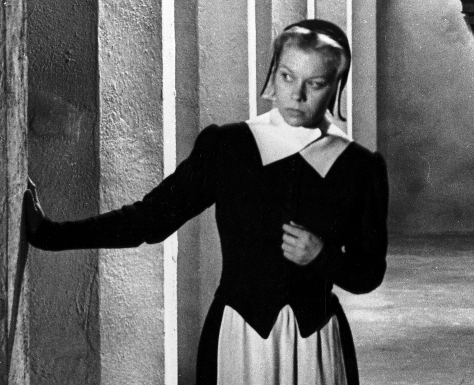Understandably, since it was filmed in German-occupied Denmark during World War II, the 1943 Day of Wrath is often interpreted as a parable. The witch hunters in this 17th-century tale are like the Nazis, you see, and those who denounce innocent women are like collaborators. Or, if you wanted to stretch the analogy forward in history, the cycle of accusation, torture, false confession (and possible death) could be applied to Guantánamo and Abu Ghraib. But the movie is also a rigorous and inexorably tragic love triangle rendered by the stern moralist Carl Theodor Dreyer (1889-1969), perhaps best known for his great silent film The Passion of Joan of Arc. Women are on trial here, too: first a gray-haired herbalist cruelly interrogated by the clergy; then the head clerics much younger wife Anne (Lisbeth Movin), who arouses the hatred of her mother-in-law and the ardor of her stepson (Preben Lerdorff Rye). Caught in between, the gaunt old priest (Thorkild Roose) has some secrets himself, since, as a widower, he condemned Annes mother to the flames in order to marry the pert blonde virgin prize. You hypocrite, you liar! screams the next woman on the stake. Her anger eventually infects Anne as well. Is it a sin to love? she demands. Well, in 1623, when superstition rules and the arbiters of justice are a bunch of bitter old misogynist churchmen, yes. Day of Wrath remains a stark, ever-timely examination of how authorities can prey upon the weak and the powerless, how morality becomes an instrument of state control. (NR) BRIAN MILLER
Dec. 26-Jan. 1, 7 & 9 p.m., 2008




